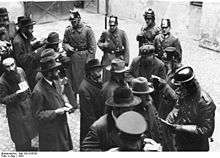Disarmament of the German Jews
The Disarmament of the German Jews started in 1933, initially limited to local areas. A major target was Berlin, where large-scale raids in search for weaponry took place. Starting in 1936, the Gestapo prohibited German police offices from giving firearms licenses to Jews.[1] In November 1938, the „Verordnung gegen den Waffenbesitz der Juden“ prohibited the possession of Firearms and bladed weapons by Jews.
Weimar Republic
The legal foundations that the National Socialists later used for the purpose of disarming the Jews were already laid during the Weimar Republic. Starting with the Reichsgesetz über Schusswaffen und Munition (Reich law on firearms and ammunition), enacted on the 12th April 1928, weapon purchase permits were introduced, which only allowed "authorized persons" the purchase and possession of firearms. Mandatory registration of weapons was introduced, which gave the government the opportunity of accessing weapon owner and their weapons at any given time. Manufacture and sale of weapons was only permitted if authorized so. The purpose was to ensure that firearms were only issued to "reliable individuals". Starting in 1930, bladed weapons were also regulated. The carrying of weapons in public now required a weapons permit.
Takeover of the National Socialists

Immediately following the „Machtergreifung“ in 1933, the weapon laws of the Weimar Republic were used to disarm Jews, or to use the cheap excuse of "searching for weapons" as a justification for raids and searches of homes. Because the weapons law of 1928 gave the police the authority to issue or withdraw weapon permits, Jewish weapon owners were disarmed through warrants issued by the police. For instance, the president of the police of Breslau enacted an order on the 21 of April 1933 which stated that Jews had to give their weapons and shooting permits to the police immediately. After the Jewish population was judged as not to be trusted, no weapon permits were issued to them anymore.[2]
The weapons law was also used for searches of homes and raids. The preface for that was the allegation that the victims of these searches stored large amounts of weapons and ammunition. A prominent example is Albert Einstein, whose summer residence in Caputh, near the Schwielowsee was searched in spring 1933. The only item found there was a bread knife.[3] Raids, for instance on the 4th of April 1933 at the Scheunenviertel in Berlin, also took place. Not only many weapons were found, but also a lot of publications that included criticism of the Nazi regime. Sometimes, Jews without residence permits were also found and arrested.
Starting 1935, the Gestapo prevented the issue of weapon permits and weapon purchase permits to Jews.[2] The police authorities were the executing authorities, and had to comply with the orders issued by the Gestapo. The self-defense of Jews was abolished and they were subjected to the arbitrariness and terror of the police authorities, without the need to introduce a new law for this.
Weapons law and act of 1938
In 1938, the national socialists reformed weapons law thoroughly. Today, the Waffengesetz of the 18. March 1938 (RGBl I, 265) is often seen as a relaxation of existing regulations, even though it primarily benefited privileged members of the NSDAP and its associated organizations.[4] The law stated that certain groups of NSDAP officials did not need any permit anymore for weapons possession. Amongst them were Unterführer of the NSDAP, starting from Ortsgruppenleiter, the Sturmabteilung, the Schutzstaffel, the National Socialist Motor Corps and also the Hitler youth, starting at Bannführer. The new weapons law also prohibited the possession of any weapons to certain groups of people, namely Gypsies and all individuals who lost their "Civil Honors" or who were under supervision of the police. The latter also included people convicted due to homosexuality.
Directly after the Kristallnacht, the possession of any weapons by Jews was prohibited through the Verordnung gegen den Waffenbesitz der Juden, enacted on the 11. November 1938 (RGBl. I, 1573).
A contemporary report of the apostolic nuntius of Berlin to Eugenio Pacelli about the Kristallnacht stated: „Also, all weapons were taken from the Jews; and even though the purpose of that was altogether different, it was good, because the ideation of suicide must have been enormous in some.“[5]
See also
References
- ↑ Uwe Dietrich Adam: Judenpolitik im Dritten Reich.
- 1 2 Halbrook 2001
- ↑ Dennis Brian: Einstein - Sein Leben.
- ↑ Joachim Steindorf: Kurzkommentar zum Waffenrecht, Verlag C.H. Beck 1999.
- ↑ Susanne Heim (publ.): Die Verfolgung und Ermordung der europäischen Juden durch das nationalsozialistische Deutschland 1933-1945. Band 2: Deutsches Reich 1938 - August 1939. München 2009, ISBN 978-3-486-58523-0, S. 452.
- Stephen P. Halbrook: Das Nazi-Waffengesetz und die Entwaffnung der deutschen Juden, in: Allgemeine Schweizerische Militärzeitschrift, Nr. 12, Dezember 2001 (PDF, 87 kB)
Further reading
- Stephen P. Halbrook: Nazi Firearms Law and the Disarming of the German Jews, in: Arizona Journal of International and Comparative Law, No. 3, 2000, pp. 483–535 (PDF, 153 kB, englisch)
External links
- Waffengesetz vom 18. März 1938 (RGBl I, 265)
- Verordnung gegen den Waffenbesitz der Juden vom 11. November 1938 (RGBl I, 1573)